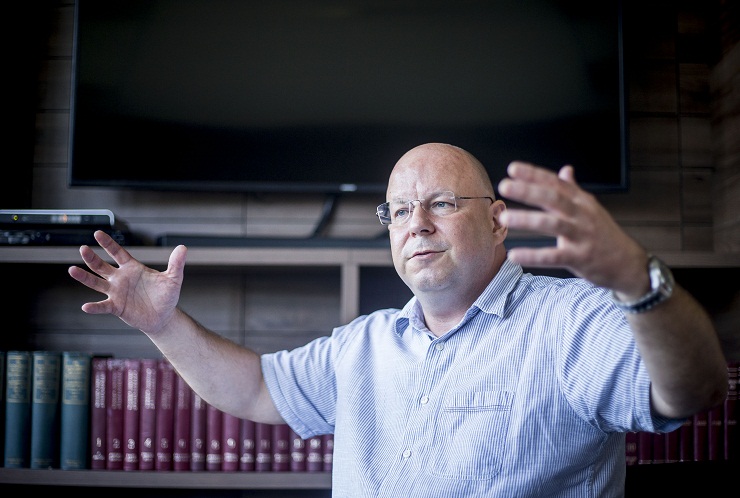Lesen Sie diesen Artikel auf Deutsch
Amid signs that public media in neighbouring Poland and Hungary increasingly serve as the promotional arm of their respective governments, recent changes to the leadership of Radio Television Slovakia (RTVS) are prompting concerns that things could take a turn for the worse here, too.
In the wake of a politically charged selection process, Jaroslav Rezník took over as general director of RTVS in August. Rezník’s turn-of-the-century tenure heading Slovak Radio as an appointee of the semi-authoritarian strongman premier Vladimír Mečiar and continued close ties with the conservative nationalist Slovak National Party (SNS) are viewed as particular cause for concern. He takes over for Václav Mika, who was eligible for a second five-year term and is widely credited with setting RTVS on a positive course as both ratings and public confidence in the news gathering operation showed a marked increase during his tenure.
“When you look at how the news became more objective and trustworthy under Mika, there was no real reason to change – on the contrary,” Rasťo Kužel, of the Bratislava-based media monitoring NGO Memo 98, said. “Rezník has a track record as a ‘yes’ man.”
Public television and radio face stiff competition from the private sector in Slovakia, including the 24-hour television news channel TA3, but are among the most highly trusted sources of information in the country in opinion polls. By mid-September, Rezník was already making his presence felt as he replaced the head of RTVS’s news operation.
“Rezník has been a boss in the media sphere on and off for 20 years, but he still does not understand that news should be independent,” Miroslava Kernová, editor-in-chief of the media news website Omediach.com and one of many prominent Rezník critics, said.
Rezník obtained the job through a June majority vote in parliament. While both Prime Minister Robert Fico’s ruling Smer party and SNS backed him from the start, the government’s third coalition partner, the centre-right Most-Híd, showed a surprise change of heart in voting for Rezník.
“The best ex-thieves are said to make the best property guards,” Most-Híd chairman Béla Bugár told the Sme daily at the time, referencing Rezník’s past as part of the pro-Mečiar information machinery.
Though Rezník faces potential checks on power by the nine-member RTVS board, those members are likewise chosen by a simple majority of MPs. RTVS statutes require board members to have certain levels of expertise, but the potential for politically motivated appointees remains.
“If the vote is in parliament, it is never independent,” Kernová said.
Kužel attributed Bugar’s reversal to “pure, calculated self interest” in order to maintain his standing in the government. Meanwhile, political analysts contend that Rezník is closely allied with the SNS, and note that during his previous job as head of the state-owned TASR newswire the SNS received friendly news coverage disproportionate to the party’s actual influence.
The SNS leadership has also expressed hostility toward RTVS, with chairman and parliament speaker Andrej Danko proposing to cancel the licence fees Slovaks pay to finance the public broadcaster — a move that would spur a funding crisis, forcing the news operation to cut costs and weakening RTVS’s watchdog capacity.
With regional elections approaching in November, media monitors are set to scrutinise RTVS coverage in the coming weeks. Concerns that political connections, rather than professional merit, secured Rezník the job are such that even the government’s own culture minister, Smer’s Marek Maďarič, has since suggested that the selection process be changed and instead be led by an apolitical board of electors. Still, little practical progress in amending the process has occurred since Rezník was chosen.
In an atmosphere where Russian-backed media and propaganda is creating tumult in the region, Rezník is also viewed as a curious choice. Earlier this year, while still working at TASR, he signed a cooperation agreement with the Russian news outlet Sputnik, before quickly nullifying the deal amid a public backlash.
“It could be he was not aware [of Sputnik’s reputation at a Kremlin mouthpiece], which is bad, or it could be that he was acting on behalf of somebody politically, which is even worse,” Kužel said.
Along with the improved reputation RTVS has garnered in recent years, the changes come as the Slovak government is widely perceived as attempting to distance itself from the illiberal style of governance now prevailing in Poland and Hungary. Prime Minister Robert Fico has been at pains to insist his country — a Schengen and eurozone member — is looking to remain in the European mainstream amid any coming realignment of the European Union. “The fundamentals of my policy are being close to the [EU] core, close to France, to Germany,” Fico said August 15.
Rezník’s selection would seem to run counter to narratives that Fico is morphing into some sort of liberal internationalist. At the same time, in comparison to one-party rule in Hungary and Poland, political power in Slovakia remains more dispersed. The country is governed by a three-party coalition and though private media also face challenges from concentrated ownership, among other things, public discourse remains relatively varied and vibrant.
“In Hungary and Poland it is clear the incumbent governments set about destroying checks and balances, and public media outlets do not serve as a watchdog,” Kužel said, noting that threats to media independence in Slovakia are not nearly as acute.
At the same time, Rezník remains a potent reminder that any recent improvements in public media are at risk.
“Fico is alien to the concept of public service broadcasting with hard-hitting news, there is a complete lack of understanding for the role a public broadcaster should play in a modern society,” Kužel concluded.



